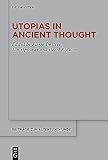Utopias in Ancient Thought / ed. by Pierre Destrée, Jan Opsomer, Geert Roskam.
Material type: TextSeries: Beiträge zur Altertumskunde ; 395Publisher: Berlin ; Boston : De Gruyter, [2021]Copyright date: ©2021Description: 1 online resource (XIV, 309 p.)Content type:
TextSeries: Beiträge zur Altertumskunde ; 395Publisher: Berlin ; Boston : De Gruyter, [2021]Copyright date: ©2021Description: 1 online resource (XIV, 309 p.)Content type: - 9783110738209
- 9783110733419
- 9783110733129
- 880.9 23
- online - DeGruyter
- Issued also in print.
| Item type | Current library | Call number | URL | Status | Notes | Barcode | |
|---|---|---|---|---|---|---|---|
 eBook
eBook
|
Biblioteca "Angelicum" Pont. Univ. S.Tommaso d'Aquino Nuvola online | online - DeGruyter (Browse shelf(Opens below)) | Online access | Not for loan (Accesso limitato) | Accesso per gli utenti autorizzati / Access for authorized users | (dgr)9783110733129 |
Frontmatter -- Content -- Preface -- The quest for the best. Praise, blame, utopia -- What will we do when we get there? Utopia and Dicing in Greek Comedy -- What Thomas More learned from Herodotus about Utopia -- Temporality and utopia in Xenophon and Isocrates -- Plato’s ideal society and Utopia -- Plato and Utopia: Philosophy, Power, and Practicability in Plato’s Republic -- Plato and the utopia within us -- Aristotle’s ‘City of our Prayers’ within the History of Political Utopianism -- Utopia and the quest for autarkeia -- Were the later Stoics anti-utopians? -- Cicero and the Golden Age Tradition -- All Over the World: The Utopian Idea in Diodorus Siculus -- Laughter in Lucian’s Utopias of the Dead -- Tao Yuanming’s ‘Peach Blossom Source’ and the Ideal of the ‘Golden Age’ in Classical Antiquity: Utopias in Ancient China and Classical Antiquity -- Index locorum
restricted access online access with authorization star
http://purl.org/coar/access_right/c_16ec
This collection deals with utopias in the Greek and Roman worlds. Plato is the first and foremost name that comes to mind and, accordingly, 3 chapters (J. Annas; D. El Murr; A. Hazistavrou) are devoted to his various approaches to utopia in the Republic, Timaeus and Laws. But this volume's central vocation and originality comes from our taking on that theme in many other philosophical authors and literary genres. The philosophers include Aristotle (Ch. Horn) but also Cynics (S. Husson), Stoics (G. Reydams-Schils) and Cicero (S. McConnell). Other literary genres include comedic works from Aristophanes up to Lucian (G. Sissa; S. Kidd; N.I. Kuin) and history from Herodotus up to Diodorus Siculus (T. Lockwood; C. Atack; I. Sulimani). A last comparative chapter is devoted to utopias in Ancient China (D. Engels).
Issued also in print.
Mode of access: Internet via World Wide Web.
In English.
Description based on online resource; title from PDF title page (publisher's Web site, viewed 28. Feb 2023)


